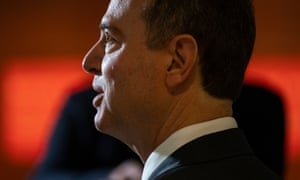The White House refuses to send witnesses to the House inquiry. Talk of obstruction grows. Experts say a crisis is at hand

Summoning the full force of its constitutionally vested powers, Congress last week called 13 witnesses to appear for questioning in the impeachment inquiry against Donald Trump.
Two of them showed up.
Four of the would-be witnesses the acting White House chief of staff, two senior officials in the budget office and a state department lawyer failed to appear in spite of congressional subpoenas, as distinct from requests.
A fifth witness, former national security adviser John Bolton, warned that he would reply to any subpoena with a lawsuit.
The story of the Trump presidency is one of repeated power struggles between branches of government and within the executive branch. But the standoff that has developed between the White House and the legislature during the impeachment inquiry, constitutional experts say, is loaded with dangerous potential to upset the balance of power and wreck the ability of Congress to check the president.
This is about as intense a conflict as we could imagine between the branches, said Michael J Gerhardt, a professor at the University of North Carolina school of law and an expert on impeachment and the constitution.
It is unusual, though not unprecedented. This may be a great example of what we call constitutional hardball, where everybodys kind of pushing their powers at least to their boundaries, if not beyond.
The refusal of executive branch officials to comply with lawful congressional subpoenas has been compared to Richard Nixons refusal to turn over recordings of Oval Office conversations to investigators in the Watergate affair. In that standoff, Congress ultimately prevailed.
But the third article of impeachment against Nixon, for obstruction of the House impeachment inquiry, rested on far more limited withholding of information from the House than that which is being pursued by Trump, said Frank O Bowman III, author of High Crimes and Misdemeanors: A History of Impeachment for the Age of Trump and a professor at the University of Missouri school of law.
Its completely abnormal, Bowman said of the witness absences. Inasmuch as the no-shows are in response to presidential orders or strong admonitions, they amount to obstruction of the Houses constitutional impeachment function and are therefore a free-standing ground for impeachment.
The Trump administration has withheld more than just witnesses. Top officials including vice-president Mike Pence, secretary of state Mike Pompeo, energy secretary Rick Perry and acting chief of staff Mick Mulvaney have defied subpoenas for documents. So have agencies including the defense department and budget office.
Witnesses with no formal role in the administration have defied Congress, too at times rather punchily.
Refusing a subpoena for documents, lawyers for Rudy Giuliani condemned the impeachment inquiry as unconstitutional, baseless and illegitimate. A lawyer for Lev Parnas and Igor Fruman, Ukrainian Americans arrested last month on campaign finance charges, asserted attorney-client privilege in withholding documents, because the two men assisted Mr Giuliani in connection with his representation of President Trump.
Neither man is a lawyer. Parnas has since switched lawyers and said he will cooperate.
Political talking points, and no law
In defying Congress, the would-be witnesses have relied, explicitly and implicity, on an overarching case for non-participation made in a pugnacious eight-page letter sent to Congress in October by White House counsel Pat Cipollone.
Given that your inquiry lacks any legitimate constitutional foundation, any pretense of fairness, or even the most elementary due process protections, the Executive Branch cannot be expected to participate in it, the letter said.
A half-page letter from lawyers for Giuliani said the former New York mayor adopts all the positions set forth in Mr Cipollones letter.
The acting director of the office of management of the budget (OMB), Russell Vought, invoked the White House gag order in a dismissive tweet defying his subpoena.
I saw some Fake News over the weekend to correct, he wrote. As the WH letter made clear two weeks ago, OMB officials myself and Mike Duffey will not be complying with deposition requests this week. #shamprocess
As a legal document, the White House letter is weak, according to experts.
I think it was filled with a number of political talking points, and no law, said Gerhardt.
Bob Bauer, a former White House counsel under Barack Obama, wrote: On the merits, it is an exceptionally weak performance. Add to this another deficiency: its glaring failure to effectively represent the institutional interests of the presidency.

The noncooperation of executive branch officials could have serious implications for the impeachment inquiry, potentially depriving Congress and the public of crucial evidence.
Mulvaney might testify about how, exactly, the order came down for the OMB to suspend military aid for Ukraine. Perry attended several key meetings and could add to previous firsthand testimony about the precise nature of the deal Trump was pursuing. Bolton has said he might someday testify to relevant firsthand conversations he had with the president.
Pompeo could supply evidence that might help explain why the Ukraine plot gave rise to a moment of truth for so many career foreign service officers.
The 18 witnesses from the executive branch to have spoken to the impeachment committees so far have done so in defiance of the White House gag order.
Adam Schiff, chairman of the House intelligence committee, told reporters this week the executive branch refusal to cooperate amounted to evidence of obstruction of the inquiry, suggesting Trump, like Nixon, might face an article of impeachment along those lines.
The White House excuses keep changing, Schiff said. First it was: the House hasnt held a vote. Then, a claim of immunity never upheld by a court. Now they want their lawyers to participate, which is against the rules Republicans wrote.
It doesnt add up except as evidence of obstruction.
Read more: https://www.theguardian.com/us-news/2019/nov/09/trump-impeachment-constitution-congress


Recent Comments